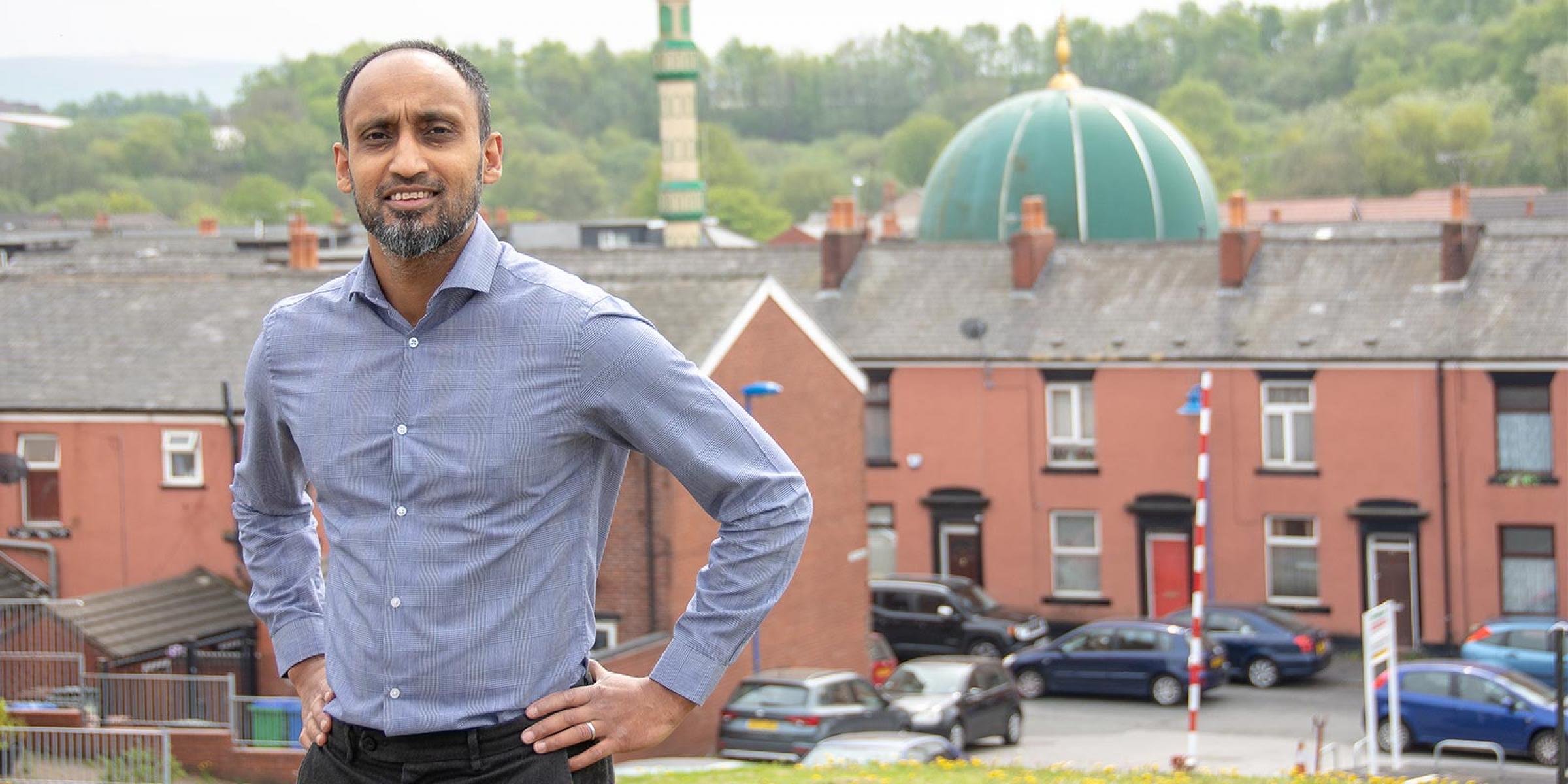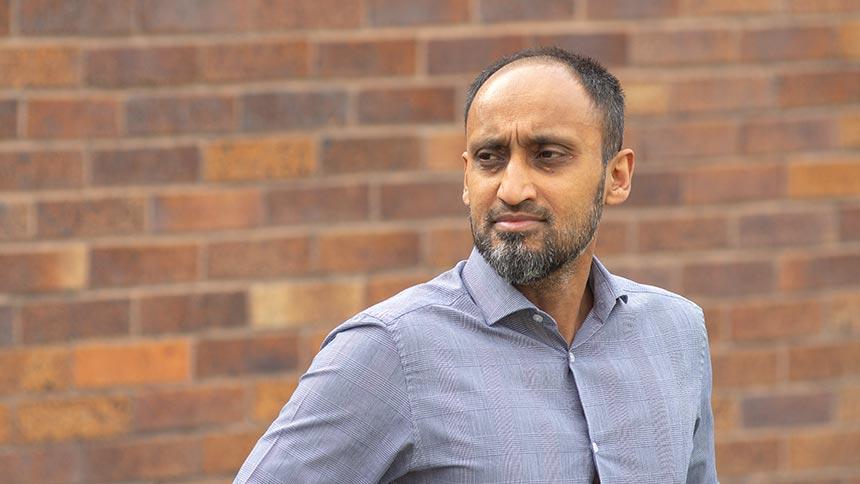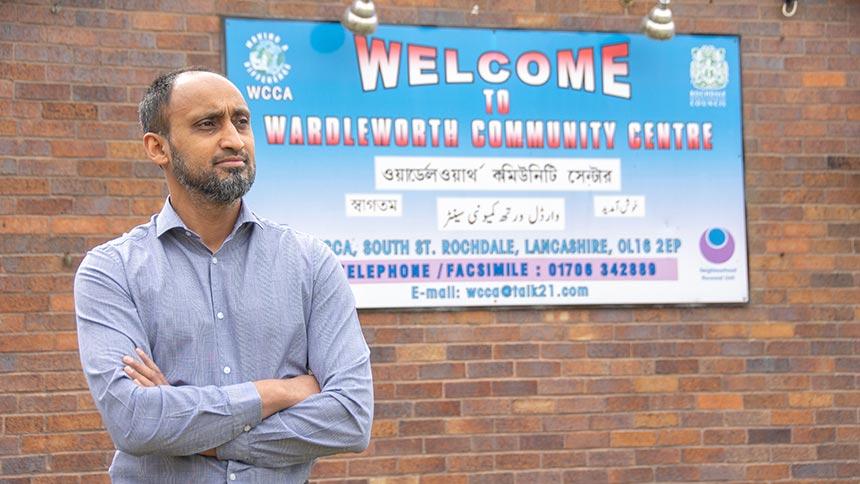
Change is possible: A former carer making a difference with his story
Conscious of stigma and myths about dementia in many communities, Dewan Choudhury wants his story to help create change.
'My father’s story is powerful because of who it happened to – because of who he was.’
When community figurehead Ayubur Raja Choudhury was diagnosed with vascular dementia in 2015, his son Dewan had never even heard of the condition.
Now Dewan is sharing his experiences of supporting his father in an effort to change attitudes towards dementia in his local community and beyond.
Lion and leader
Ayubur came to England from Bangladesh with his father in 1958, aged 20. Living in Rochdale, he worked in a mill as a weaver. He stayed with the same firm for 30 years, though his early days in a new country were challenging.
‘Life was very difficult at first, he felt like an alien,’ says Dewan. ‘It was a different world, a culture shock.’
Ayubur already had a good grasp of English, which meant that other people who didn’t, came to him for information or advice. He also pushed for civil and workers’ rights.
‘Straight away, he became a mentor for the migrant community,’ says Dewan. Ayubur helped set up the first mosque in Rochdale and a community centre. He was also a voluntary teacher and lobbied MPs about the issues that affected migrants and poorer people.
‘He was a lion of a man – a leader,’ says Dewan. ‘He was magnificent.’
Health problems
It was only as Ayubur entered his mid to late 60s and gave up some of his community work that the family realised the extent to which his health had been deteriorating.
‘When he started spending more time at home, I saw that he wasn’t as physically strong as he used to be,’ says Dewan.
‘Mum also started saying he was forgetting a few things – dates, his keys, what he’d eaten.
‘He was always a brilliant storyteller, but his stories were becoming more confusing to follow. We dismissed it all as old age.’
In 2012, Ayubur had a fall and broke two bones in his back. This meant he was unable to leave his bed for three or four months.
‘The lack of activity caused his memory to deteriorate,’ says Dewan. ‘But even then we put it down to an old man who had a bad injury.’
It turned out that Ayubur had also been having a series of minor strokes. After a major stroke in 2015 he was taken to hospital, where he had a brain scan.
‘The amount he’d forgotten was unbelievable – it crystallised how ill he was,’ says Dewan.
‘I’ll never forget it,’ says Dewan. ‘The doctor said, “I can’t be 100% sure but from my experience it looks like your father has vascular dementia.”
‘I thought, “Vascular dementia – what’s that?”
‘The doctor also said, “He will deteriorate and this will take him.” He didn’t mince his words and I thank him for that.’
A visit to a GP saw Ayubur referred to a memory clinic for tests.
‘The amount he’d forgotten was unbelievable – it crystallised how ill he was and how much of him had gone,’ says Dewan.
Mental strain
Dewan describes the dementia diagnosis as a ‘bombshell’.
‘I started researching it but we didn’t know what to do,’ he says. ‘I have so much respect for the NHS, but I don’t think it has a clear plan for people with dementia and carers.’
Dewan and his siblings took turns to support their mother Rukeya to care for Ayubur.
‘We treated him as the same person, not a patient,’ says Dewan. ‘We told everybody he had dementia, to make it more normal.
‘Luckily we had a strong family unit – I don’t know how people cope on their own. It’s so mentally strenuous. Carers must become ill because you’re living two lives.’
As his condition progressed Ayubur experienced hallucinations and would also shout and swear at his wife, which was very out of character.
‘Mum was a rock. She had to cope with everything and see him change, but she powered through,’ says Dewan.
Ayubur died in May 2018 at the age of 78.

Dewan had never heard of dementia until his father was diagnosed
Walking blind
While the family were hugely supportive, Dewan had been conscious of potential judgement from the wider community.
‘There’s no word for dementia in Bengali, so when my father was officially diagnosed it was pretty much impossible to explain it to a non-English speaker,’ he says.
‘There’s a problem in South Asian communities – they’re quick to say, “He’s crazy” or “possessed”, or play the mental health card. There’s stigma.
‘Putting someone in a care home would be filed under “neglect”.
‘It isn’t people’s fault, but there’s a lack of knowledge.’
To help dispel any such myths, and to explain why local people may have seen Ayubur behaving differently or not seen him as much, Dewan posted a detailed message on Facebook.
‘I said, “He’s got vascular dementia – this is what it is and this is what we’re doing,”’ he explains.
‘The response was amazing. The amount of advice we got was invaluable. People even gave us a wheelchair and a commode.’
‘The best education I got was reading people’s stories,’ says Dewan.
Dewan was contacted by Shahid Mohammed, a former carer from Rochdale who is involved with Tide, an organisation supporting dementia carers.
‘I met Shahid and he told me, “You’re doing an amazing job,”’ says Dewan. ‘That was reassuring because as a carer you’re walking blind.’
Advice from other carers became a vital source of support for Dewan.
‘The best education I got was reading people’s stories,’ he says.
‘Professionals are very good at telling you the scientific side but carers provide the best information and guidance you can get. It’s also empowering to know that you’re not on your own.’

Dewan is using his story to change attitudes about dementia
Changing attitudes
Dewan has used his story in support of a Tide project, managed by Shahid, called Dementia Dekh Bhaal. This gives South Asian carers of people with dementia a platform to share their experiences.
‘Dementia Dekh Bhaal is very important in making dementia something that people talk about,’ says Dewan.
‘If people see a story about a man like my father, who they looked up to, they realise that if someone like him can be hit by dementia then anyone can.
‘People need to accept that dementia is a real thing. Getting an early diagnosis is key.’
Although he acknowledges that certain views can be ingrained, Dewan believes change is possible.
‘It’s difficult but look at me – dementia wasn’t even a word in my life before,’ he says.
‘It’s a new thing for some people but I can see they’re grasping it slowly. Education is key.
‘Attitudes will change, we just need to keep reinforcing the message.’
Community support
Shahid, who runs the dementia project for South Asian people, welcomes carers from the community to get in touch with him for support.


Wendy
saysGreat article- people friendly, plain language use, very real and personal, educating. Thanks
Allen Etheridge
saysVery interesting article
As a fellow sufferer my very best wishes to you and your father.
thank you
Allen